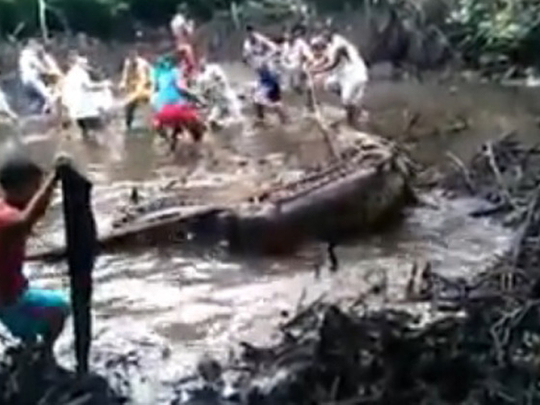
Manila: Residents of a marsh community in Rio Tuba, Batarasa, Palawan, caught a nearly five-metre long saltwater crocodile near a residential area.
Videos of the crocodile made the rounds on the internet recently showing at least six men from sitio Malabahay helping to capture the reptile with nothing more than a long wooden plank, a sack to blindfold the animal and a rope.
Watch a video of the animal posted on YouTube below.
Reports said that people were alerted about the reptile after they noticed something thrashing about in the water underneath the floor of their home on July 30. Some of the homes in the mangrove area are built on stilts. As it had turned out, a crocodile was bogged down in a shallow area of the sitio after the tide ebbed.
Aside from the six men who captured the crocodile, at least a dozen children helped to drag it to a dry area one video showed. The local Palawan Wildlife Rescue and Conservation Centre as well as officials from the Biodiversity Management Bureau examined the reptile.
When contacted by Gulf News, an official from the Biodiversity Management Bureau (BMB) who requested anonymity said the presence of this species of reptile is not unusual in Palawan.
“The saltwater crocodile is a protected species in the country and there are not a lot of areas in the country where you can find them,” she said.
She also said that because of competition for habitat and food, there would be increasing incidences of encounters between man and dangerous wildlife such as crocodiles.
In July 2011, locals in Bataraza in Rio Tuba captured a similar-sized saltwater crocodile. The 4.17-metre long reptile was caught by residents after a hunt was launched after a local fisherman went missing.
The victim, identified in reports as Edwin Lucero, was believed to have been devoured by a crocodile.
At 1,075 kg and measuring 6.4 metres, Lolong, which was caught in the marshlands of Agusan del Sur, figured in the Guinness World Record as the largest saltwater crocodile ever caught in the wild.
Unfortunately, Lolong died in early 2013 due to the stress of captivity.
Unlike in other countries where hunting seasons are regulated as a form of conservation and animal control, the BMB official said the Philippines only set restrictions on endangered species such as the crocodile.
“We have laws that protect these animals to save them from extinction, but we do not have regulations that could prevent them from getting too big to become unmanageable and a threat to other wildlife,” she said.
“At the moment, I think the government does not see the need to impose regulations similar to other countries such as the United States,” she said.
In the US, years of strict enforcement of conservation policies have resulted in a boom in wildlife population. The government earns from nurturing and controlling wildlife by charging fees from hunters and limiting the number of animals that could be hunted.











